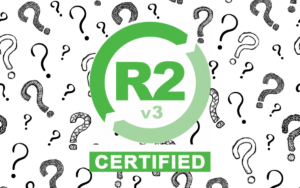
With the surge in electronic equipment usage, companies, including Keystone Technology Management, are at the forefront of promoting environmental stewardship and corporate social responsibility through sustainable practices. A cornerstone of such commendable efforts is achieving R2v3 certification, a designation that sets the gold standard for the electronics recycling industry. But what exactly does it mean to be R2v3 certified, and why should businesses and consumers pay attention? Let’s dive deep into the world of Sustainable Electronics Recycling International (SERI) and the R2 standard to uncover the value behind this prestigious certification.
What is R2v3 Certification?
R2v3 certification is the latest version of the Responsible Recycling (R2) Standard, overseen by Sustainable Electronics Recycling International (SERI). It represents a comprehensive set of criteria designed to ensure companies involved in electronics recycling adhere to the highest standards of environmental protection, data security, and worker health and safety. Achieving R2v3 certification is no small feat; it requires a rigorous audit process and a demonstrated commitment to responsible and sustainable recycling practices.
Core Requirements to Meet R2v3 Standards
Adherence to an Environmental Health and Safety Management System
One of the foundational requirements of R2v3 certification is the implementation and adherence to a robust environmental health and safety management system. This system should effectively manage and mitigate the environmental impact of the company’s recycling processes. It encompasses everything from hazardous waste handling to emergency preparedness and response, ensuring that both the environment and worker health and safety are protected throughout the recycling process.
Effective Data Destruction and Security
In our digital age, data security is paramount. R2v3 requires that certified companies have stringent data destruction protocols in place to handle electronic equipment components containing sensitive information. These standards are designed to provide high levels of data security, ensuring that all data is irretrievably destroyed before the recycling or refurbishing process.
Downstream Vendors and Supply Chain Due Diligence
R2v3 places a significant emphasis on responsible recycling practices throughout the entire supply chain. Certified companies must conduct thorough due diligence on their downstream vendors to ensure that these partners also follow environmentally responsible and ethically sound recycling practices. This requirement ensures that the integrity of the recycling process is maintained, not just within the certified entity but throughout the entire chain of custody of the recycled materials.
Focus on Reuse and Material Recovery
The R2v3 standard encourages a hierarchy of responsible recycling practices, with a preference for reuse and refurbishment of electronic equipment components whenever possible. When reuse is not feasible, material recovery and recycling are emphasized to ensure that valuable materials are recovered sustainably and efficiently. This approach aligns with the principles of the circular economy, aiming to maximize the lifecycle of electronic devices and minimize waste.
Legal Compliance and Record-Keeping
Companies seeking R2v3 certification must demonstrate compliance with all applicable local, national, and international laws and regulations regarding environmental protection, data security, and waste management. Additionally, meticulous record-keeping is required to document compliance with R2v3 standards and regulatory requirements. This transparency and accountability are crucial for maintaining the trust of clients, regulators, and the public.
Commitment to Continuous Improvement
R2v3 certification is not a one-time achievement but a continuous commitment to improvement. Certified companies are required to regularly review and enhance their processes, practices, and policies to address emerging challenges and opportunities in the electronics recycling industry. This includes staying abreast of technological advancements, evolving legal requirements, and best practices in environmental health and safety management.
Why R2v3 Matters to Businesses and Consumers
The importance of R2v3 certification extends beyond the recycling industry itself. For businesses, partnering with an R2v3 certified company for IT asset disposition, data destruction, and e-waste disposal is a smart choice for several reasons:
Environmental Impact
For consumers, choosing products and services from companies with R2v3 certification means supporting businesses committed to reducing electronic waste’s environmental footprint and upholding high ethical standards. This commitment to responsible recycling practices aligns with the growing consumer demand for businesses to be more sustainable.
Data Security
The high standards of data security that R2v3 requires provide peace of mind for businesses, who can rest assured knowing their sensitive information won’t end up falling into the wrong hands after they dispose of or sell computer hardware.
Compliance and Reputation
R2v3 certification helps businesses meet legal compliance requirements related to e-waste disposal while enhancing their reputation as environmentally responsible organizations.
Partner With Keystone Technology Management Today!
As the electronics recycling industry continues to evolve, adherence to R2v3 standards will remain a benchmark for companies committed to making a difference in the world through responsible recycling. For IT computer liquidation and e-waste disposal organizations like Keystone Technology Management, R2v3 certification signifies a commitment to responsible and sustainable corporate social responsibility, ensuring that our operations contribute positively to the environment and society. Contact us today to learn more about our services or certifications!
